Asking Big Questions
- By David Levin
- Posted 07.01.08
- NOVA scienceNOW
In this excerpt from a 2002 commencement address at Oberlin College, the late cancer researcher Judah Folkman describes how he learned to think outside the box when he was in high school. Listen in.
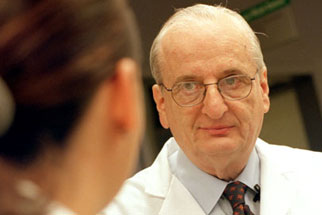 Listen
Listen
Cancer researcher Judah Folkman describes an unforgettable lesson he learned from a high school chemistry teacher.
Transcript
Asking Big Questions
Posted: July 1, 2008
DAVID LEVIN: You're listening to a NOVA scienceNOW podcast. Pioneering cancer researcher Judah Folkman was never one to back down from a challenge. In the early 1970s he found that tumors can develop tiny blood vessels to feed themselves as they grow and believed this discovery could lead to new cancer treatments. At first, his colleagues scoffed at the idea, but Dr. Folkman's work was eventually recognized as one of the most important contributions ever in cancer medicine.
In this excerpt from a commencement speech Folkman gave at Oberlin College in 2002, he describes with dry wit how he learned to think big and make unlikely connections. It all began with his high school chemistry teacher.
JUDAH FOLKMAN: He vividly demonstrated with only a few words that school was more important than memorization – thinking should follow. At the mid-semester practical exam, the high school chemistry exam, we were each handed a glass vial with an unknown compound in it, and we were to carry out various tests to determine the name of the chemical compound – copper chloride, etc. After you wrote your answer for the first vial, you received a second one – four in all – each vial worth 25 points. A hundred points was an A. Two hours for the exam. I was told I had four correct vials and was given a fifth unknown vial that could earn a bonus of an A-plus. But the clear solution I received did not test positive for any chemical. None of the tests we had learned work.
After an hour, when the chemistry lab was now empty except for the teacher working at his desk, I said to him, "Could this sample that you gave me be pure water?"
"Yes," he replied, "But you arrived at that answer by exclusion. Can you prove directly that it's water – for an additional 25 points?"
"No," I said, "We've never studied such a test – direct proof of water."
"Think," he said, "Think. Use anything in this room."
"What about other rooms in the school?" I asked. "What about the physics lab?"
The physics teacher had, two months before, taught us the principle of electrical conductivity. A battery, two wires and a light bulb. One wire is cut, put into salt water, and the bulb lights up. Conductivity. This showed that water alone did not conduct electricity because he had to add salt. I asked the chemistry teacher could we unlock the physics lab for me on the floor above, because by now it was very late in the afternoon, and the school building was closing. He went with me. I put the two ends of the wire into the unknown solution, and the bulb did not light up.
I said, "The test sample you gave me is water, and this proves it."
"Yes," he said, "But are you sure the battery is not dead?"
I added salt to the water, and the bulb glowed. The battery was okay.
"Good job," was all he said, "Good job." And he walked away. It was enough.
I started to walk home. Just before crossing the street I was struck by a sudden thought and almost by a car.
I thought, my gosh, chemistry is one subject, and physics is another. They are taught by different teachers on different floors at different times from different textbooks, but they are connected. They are connected by a few molecules. They are not separate in nature, only in school. So, aha, nature is not arranged in the same way that schools are. Later I learned, much later, that this experience is called an "aha moment" by scientists and by philosophers, an epiphany. Same thing.
Credits
Audio
- Produced by
- David Levin
- Audio provided by
- Oberlin College and Conservatory of Music
Images
- (Judah Folkman)
- © NOVA/WGBH Educational Foundation
Related Links
-
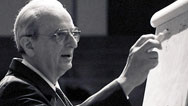
Profile: Judah Folkman
Once scorned for his ideas about how cancer grows through angiogenesis, Judah Folkman is now hailed as a visionary.
-
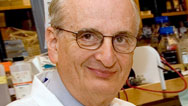
Cancer Warrior Judah Folkman
In this extensive interview, Judah Folkman reflects on his cancer research, his hopes for future treatments, and more.
-
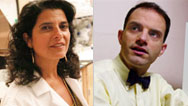
Judah Folkman: Expert Q&A
Two of Folkman's colleagues at Children's Hospital Boston answer questions about treatments for cancer and eye disease.
-
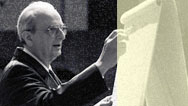
Judah Folkman Interview Excerpts
Renowned cancer researcher Judah Folkman talks about riding the "fine line between persistence and obstinacy," and more.
You need the Flash Player plug-in to view this content.



